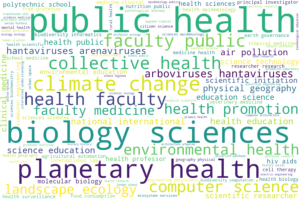A pledge for planetary health to unite all professionals in the Anthropocene
To the Editor:
We congratulate Wabnitz et al[1] for their landmark pledge, which is a breakthrough. Considering the current scientific understanding that Planetary Health is a transdisciplinary concept and, therefore, all professions are needed to safeguard human life in the anthropocene epoch, our Planetary Health Group, of the Institute of Advanced Studies at the University of São Paulo (USP)[2], composed by researchers from several areas, illustrated by Figure 1, including professionals and students from health sciences, journalism, engineering, earth science, policy and international relations, computer science, biology, chemistry, education, among other areas and belonging to several Brazilian institutions, considers it advisable to adapt and expand the Planetary Health pledge to all university graduates. The complete list of subscribers can be found at the group’s website[3].
 Figure 1. Word cloud from research areas of the USP Planetary Health Group members.
Figure 1. Word cloud from research areas of the USP Planetary Health Group members.
The Lattes Platform [4]
References
- Wabnitz KJ, Gabrysch S, Guinto R, Haines A, Herrmann M, Howard C, Potter T, Prescott SL, Redvers N. A pledge for planetary health to unite health professionals in the Anthropocene. The Lancet. 2020 Sep 30.
Planetary Health Group of the Institute of Advanced Studies at the University of São Paulo. Team [Internet]. 2019 [cited 07 October 2020]. Available from: http://saudeplanetaria.iea.usp.br/en/participantes/
Planetary Health Group of the Institute of Advanced Studies at the University of São Paulo. A pledge for planetary health [Internet]. 2020 [cited 07 October 2020]. Available from: http://saudeplanetaria.iea.usp.br/en/a-pledge-for-planetary-health/
Brazilian National Council for Scientific and Technological Development. The Lattes Platform [Internet]. 2020 [cited 07 October 2020]. Available from: http://lattes.cnpq.br/
Authors (alphabetical order):
Airton Tetelbom Stein – Universidade Federal de Ciências da Saúde de Porto Alegre
Aline Martins de Carvalho – University of São Paulo, School of Public Health
Antonio Mauro Saraiva – University of São Paulo, School of Engineering, Institute of Advanced Studies
Denise Alves Fungaro – Instituto de Pesquisas Energéticas e Nucleares
Dirce Maria Lobo Marchioni – University of São Paulo, School of Public Health
Enrique Falceto de Barros – Chair of the WONCA Working Party on the Environment
Flavio Augusto Souza Berchez – Universidade de São Paulo, Institute of Biosciences
Julio Cesar Rosa – Instituto Caminhos na Mata
Karina Pavão Patrício – Faculdade de Medicina de Botucatu – UNESP
Maria Daniela de Araujo Vianna – University of São Paulo – Institute for Advanced Studies
Mayara Floss – Grupo Hospitalar Conceição
Natalia Pirani Ghilardi-Lopes – Universidade Federal do ABC, Center for Natural and Human Sciences
Nicole de Paula, Women Leaders for Planetary Health/Institute for Advanced Sustainability-Potsdam
Projeto Ecossistemas Costeiros – University of São Paulo, Institute of Biosciences
Raquel de Andrade Cardoso Santiago – Universidade Federal de Goiás – School of Nutrition
Roberto de Almeida – UNILA Federal University of Latin America Integration, School of Medicine
Tatiana Souza de Camargo Camargo – Universidade Federal do Rio Grande do Sul, Faculdade de Educação.
Tereza Cristina Melo de Brito Carvalho – University of São Paulo, School of Engineering
The Brazilian Planetary Health students club participants:
Andre Luis Acosta – University of São Paulo, School of Public Health
Beatriz Sinelli Laham – University of São Paulo, PhD student at Institute of Biosciences
Donovan Humphrey Franco – University of São Paulo, graduate student at Institute of Biosciences
Elis Dionisio da Silva – Fundação Oswaldo Cruz – Instituto de Pesquisas Aggeu Magalhães
Fernando Xavier – University of São Paulo, School of Engineering,
Grayce Helena Domiciano – University of São Paulo, MScsC student at Institute of Biosciences
Luís Gustavo Arruda – University of São Paulo, PhD student at Institute of Biosciences
Sara Maria Xavier da Cruz – Universidade Federal de Pernambuco, Institute of Biosciences
Sheina Koffler – University of São Paulo, Institute of Advanced Studies
